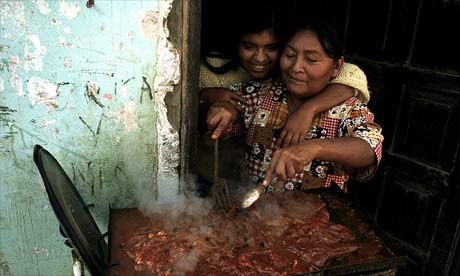
(above) Multinationals focus on South America's poor. Photograph: Corbis
Latin America's poor provide
rich pickings
June 17, 2008 - Guardian.co.uk
Peruvian housewife Genoveva Airaconda (above) spends her days visiting neighbours around her shanty town on the outskirts of Lima.
It might not sound like a profitable pastime, but her visits provide a steady income for her family as well as adding to the bottom line of Swiss-based multinational Nestlé.
Airaconda is one of hundreds of door-to-door salespeople that the food giant has recently employed to sell their nutritional products in the Peruvian capital.
By using local, trusted vendors, Nestlé has seen its revenue from Peru's lowest income sector increase from zero to a third of all profits.
"The real opportunity for growth for our company is in the lowest social economic group," Rafael Danieluc, marketing director of Nestlé Peru, confirms enthusiastically.
After decades targeting society's richest sectors, companies across Latin America are beginning to cotton on to the hidden potential among the poor.
Consumer goods company Procter & Gamble, for example, has seen its market share rise in Colombia after launching a soap specially-designed for low-income consumers with little water access.
Banks are also winning thousands of new customers from those who've traditionally shunned – or been shunned by – mainstream financial services.
Bolivian bank Protem, for instance, has seen the number of its rural clients jump after introducing voice-activated ATM machines in the indigenous language.
This is business, not charity, so the so-called Base of the Pyramid (BoP) theory runs. Around seven in 10 Latin Americans live on less than $9 (£4.61) a day. It may not sound like much, but aggregated together and you have yourself an estimated $510bn market.
Development benefits
Companies are not the only ones flocking to these untapped consumers. Development agencies believe bringing affordable products and services to Latin America's 360 million poor could help alleviate poverty.
Leading the charge is the Washington-based Inter-American Development Bank (IDB), which has earmarked $250m to promote BoP ventures across Latin America.
"We hope to identify some commercial market-based models with companies and ideally jumpstart this market," explains IDB senior specialist, Elizabeth Boggs Davidsen.
The IDB will agree a loan of $25m in leveraged debt to Ignia, a Mexican-based social venture fund.
Set up in July 2007, Ignia looks to make strategic investments in businesses focused specifically at low-income communities.
Top of the fund's list are sectors that have a "disproportionate impact on poverty", such as access to healthcare, housing, education and basic utilities such as water and power.
"When you look at existing services for the poor ... the value proposal is terrible," argues Michael Chu, Ignia's managing director.
He cites Mexican healthcare as a case in point. Although every citizen is entitled to free medical attention, patients typically wait six hours or more to see a public doctor. For a day labourer, that's a day's lost wages.
"So the poor are already paying, even though the service is free," continues Chu, pointing out that medical care now represents an annual $27bn cash market in Mexico.
One of Ignia's first investments is expected to be in a pre-pay clinic service operating in low-income neighbourhoods.
"There's one of these right now in Mexico. There should be 5,000," says Chu.
By improving doctor efficiency and streamlining administration, poor customers will pay annually what they currently spend on two or three visits to a private doctor.
Challenges
Profiting from the poor has its challenges though. First is the question of ethics.
BoP advocates defend market-based models as the only way to bring scale, long-term sustainability and competition to enterprises operating at the grassroots.
"No business, whether it's an individual street vendor or a large multinational, can ever be sustainable without being profitable," maintains Shona Grant, director of the development focus area at the industry-led World Council for Sustainable Business.
Civil society groups are less sure. Compartamos, a Mexican micro-finance institution, sparked widespread controversy last year when it pocketed $467m after going public.
Nobel prize winner and micro-credit guru Muhammad Yunus decried the small loan provider as a "money lender".
"Poor communities need to ensure they are not being exploited by being turned into consumers for multinational enterprises," adds John Hilary, executive director at the anti-poverty charity War on Want.
"In the final analysis, these are profit-making corporations, not charities," he continues.
Ethical issues aside, there's the practical issue of turning a profit in poor communities.
The marketing, distribution and sales systems of most large multinationals are all geared towards the market's top end. Attracting poor customers means turning those approaches on their head.
"You can't just take your success from the international market and apply it to local markets in Latin America," warns Alana Libow, co-author of a recent report on BoP strategies in Latin America.
"The key leaders in the next 20 to 30 years are the ones that figure out these markets," she predicts.
Today, many companies consider the bottom of the pyramid as a charitable sideline. Failure to change and it could soon be a reduced bottom-line that they're considering.